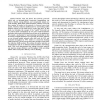Free Online Productivity Tools
i2Speak
i2Symbol
i2OCR
iTex2Img
iWeb2Print
iWeb2Shot
i2Type
iPdf2Split
iPdf2Merge
i2Bopomofo
i2Arabic
i2Style
i2Image
i2PDF
iLatex2Rtf
Sci2ools
129
click to vote
DCOSS
2013
Springer
2013
Springer
Forwarder Selection in Multi-transmitter Networks
—Recent work has shown that network protocols which rely on precisely-timed concurrent transmissions can achieve reliable, energy-efficient, and conceptually simple network flooding. While these multi-transmitter schemes work well, they require all nodes in the network to forward every data packet, which has inherent inefficiencies for non-flooding traffic patterns (where not all nodes need to receive the data). In this work, we formalize the concept of the “useful” forwarder set for point-to-point transmissions in low power multi-transmitter networks, those nodes which help forward data to the destination. We present a mechanism for approximating membership in this set based on simple heuristics. Incorporating forwarder selection on our 66-node testbed reduced radio duty cycle by 30% and increased throughput by 49% relative to concurrent flooding while preserving a 99.4% end-to-end packet reception ratio under the collection traffic pattern. We envision forwarder selectio...
Related Content
| Added | 28 Apr 2014 |
| Updated | 28 Apr 2014 |
| Type | Journal |
| Year | 2013 |
| Where | DCOSS |
| Authors | Douglas Carlson, Marcus Chang, Andreas Terzis, Yin Chen, Omprakash Gnawali |
Comments (0)

